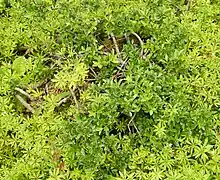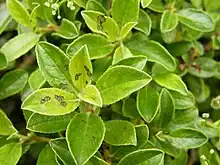| Salix arbuscula | |
|---|---|
 | |
| General view: in the center, surrounded by Galium odoratum | |
| Scientific classification | |
| Kingdom: | Plantae |
| Clade: | Tracheophytes |
| Clade: | Angiosperms |
| Clade: | Eudicots |
| Clade: | Rosids |
| Order: | Malpighiales |
| Family: | Salicaceae |
| Genus: | Salix |
| Species: | S. arbuscula |
| Binomial name | |
| Salix arbuscula | |
Salix arbuscula, the mountain willow,[1] is a low, much branched shrub (to 0.7 metres) having a limited distribution in Northern Europe, occurring from north Scandinavia eastwards to Siberia. In Scotland it can be found on damp rocky mountain slopes and ledges, generally at altitudes above 600 metres, rarely outside Perthshire and Argyll.[2]

Lower surface of leaf

Petiole

Upper surface of leaf
As described in Stace[3] and BSBI[2] Salix arbuscula has the following characteristics:
- Twigs slightly hairy at first, later hairless and dark reddish brown.
- Leaves usually ovate up to 5 cm long by 3 cm wide; hairless and bright green on upper side; at first densely hairy on lower side, then hairless; margins with numerous small blunt teeth.
- Petiole short, occasionally up to 8mm long but usually less than 5mm.
References
- ↑ BSBI List 2007 (xls). Botanical Society of Britain and Ireland. Archived from the original (xls) on 2015-06-26. Retrieved 2014-10-17.
- 1 2 Willows and Poplars of Great Britain and Ireland, BSBI Handbook No. 4; Meikle; 1984.
- ↑ New Flora of the British Isles; Clive Stace; Third edition; 2011 printing.
This article is issued from Wikipedia. The text is licensed under Creative Commons - Attribution - Sharealike. Additional terms may apply for the media files.